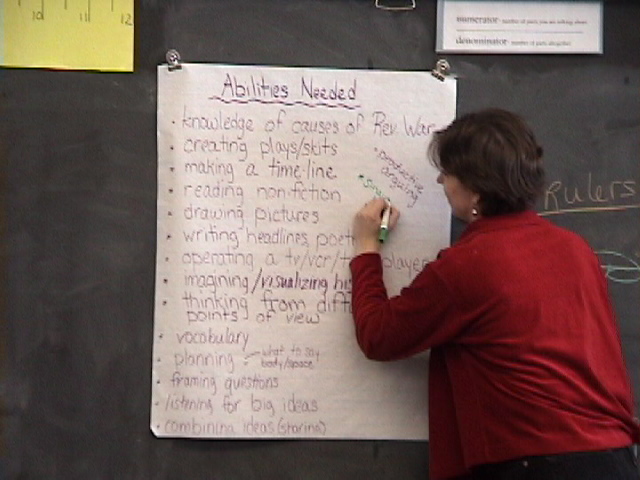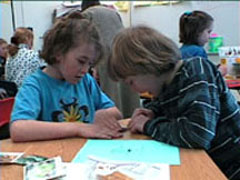Question: My two concerns revolve around time in the activities. The CI activities will be carried out over three days in thirty minute blocks. The pre and post assessment will take place the day before Ci begins and the day after CI concludes. Unfortunately, five students will not be able to participate in the activity because they meet with the class reduction teacher at that time. These five will return to catch the last five minutes of CI. How do I handle that? Should I have them observe, ask questions, or record notes? I cannot include these five in a group, but I don't want to exclude them. NH |
RESPONSE: Your inclination about what to do with those five returning students is right on. They do need to be involved. My thoughts run towards including them as observers. I'd have them use the whole class observation form and help you out by giving you a reading about how many children are on task. You will probably want to adapt the form for your purposes. Basically, it has the kids scan a group at a given moment and not how many are talking are working together, working with materials, reading, listening, off task, or out of group. There may be other things you want them to watch for as well. I'd suggest you have each one assigned to a group and have them do a scan once a minute and/or on your signal. |
|
|
|
Question: I am feeling pretty good about the projecct. I have my activities pretty well planned. I am just trying to find some creative multiple ability ways to report out (individual report). For my class, I came up with some engaging activities becausse my class needs exciting engaging hands on stuff. The only concerns I have are:
|
Response: These are really good questions. They get at the heart of some of the complex instruction strategy.
|
 |
 |
| Concern: My concerns are with planning the actual activities and making them "rich tasks." Another concern I have is that the tasks will either be finished really quickly, or that the groups will take a long time and it may last a whole week? AL |
Response: I understand your concern for time. This I think is one of the classic dilemma's of new teachers. How do you know before you do something whether it's too much or not enough? This is a great place to use your cooperating teacher. They have a better grasp of time and the nature of an activity because of all that experience they bring to the classroom. If your activity is rich, then it shouldn't be too short. You can always cut it off if it's going too long. Now I know no one wants to do this. No one wants to stop a group in the middle of their learning. On the other hand, just remember, if they have an effective and clear report out, the next day's group will have more information to make their task flow more easily. That's the beauty of redundancy.And again, a rich task is conceptual as opposed to narrow, has many
possible answers, as opposed to one right answer, and uses several different
multiple abilities to complete it.
|
|
|
|
| Concern: I feel concerned because in my classroom, we don't work a lot in groups so I haven't had a chance to implement the roles into my classroom. THe week before I start my CI rotation I will talk about all the "stuff." But who knows... . I feel good about my bit idea and my activities. I think the students will have fun with them and learn a lot. AC |
Response: Sounds like you are ready to go! A week of good solid preparation should serve you okay. Don't try to do more than the kids can do. It's okay to stretch them a bit but not beyond their - what's that famous place? - their zones of proximal development. Remember to note the multiple abilities on a chart as you begin and add to them with the children as you go along. They will see their thinking is important to you and this will help. You remember to assign competence when you see those multiple abilities in action, okay! (What are those four criteria??? name, identify the ability, tie it to the group task, is possible connect it to a real job/profession. Good luck! |
|
Concern: One of my concerns is that the students in my class never work in groups. I am all for it and will try to do it during my solo weeks. The other concern I have is coming up with three or four activities dealing with Woodland Indians. Do you have a few ideas? If so can you get back to me. KM |
Response: If your class never works in groups, then don't jump into CI immediately. During your solo week one, do some low key group work - easy tasks, maybe a few roles, small groups.It's important that the tasks be fun for the children. Work up to the ci work. Maybe you only want to do two activities across four groups and focus most of your orientation and wrap-ups on what make the groups work well together - the social skills "moves." Woodland Indians Activities: Make them rich, with several multiple
abilities in each group. Here are some ideas. The Big Idea
might be around how the WIs adapted to their environment. I'd aim for one
activity to be a drawing activity centering on a spirit ceremony or a design
for beadwork, one to be a role playing of perhaps a trading pow-wow with
white traders , one activity to interpret a story, and one activity to
design a village and to draw that village. Think aboutthe resources
needed for each, and remember to reinforce each of the reports as an example
of an adaptation to environment. How's that for off the top of my
head?
|
